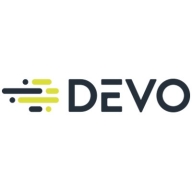

Devo and Sumo Logic Observability compete in the observability platform category. Devo seems to have the upper hand in data ingestion speed and analytics depth, whereas Sumo Logic Observability stands out with flexible dashboard customization.
Features: Devo provides robust data ingestion, fast query speed, and deep analytics. Sumo Logic Observability offers flexible dashboard customization, extensive integration options, and comprehensive feature sets.
Room for Improvement: Devo could improve its alerting mechanisms, enhance mobile support, and improve documentation. Sumo Logic Observability needs better reporting capabilities, easier setup processes, and clearer documentation.
Ease of Deployment and Customer Service: Devo has straightforward deployment with solid customer support. Sumo Logic Observability's deployment receives mixed reviews on setup complexity but has responsive and effective customer service.
Pricing and ROI: Devo offers good value with positive ROI in a shorter timeframe. Sumo Logic Observability is perceived as expensive but worth the investment for its extensive features, though ROI takes longer to realize.
This is particularly evident when dealing with failed login attempts and determining true versus false positives.
When they see a spike in a line chart for a failed login, which could be a true or false attempt, they can click that spike, and a table widget on the same active board instantly populates with raw logs of data for those specific failed logins.
| Product | Market Share (%) |
|---|---|
| Sumo Logic Observability | 1.4% |
| Devo | 1.1% |
| Other | 97.5% |

| Company Size | Count |
|---|---|
| Small Business | 8 |
| Midsize Enterprise | 4 |
| Large Enterprise | 11 |
Devo is the only cloud-native logging and security analytics platform that releases the full potential of all your data to empower bold, confident action when it matters most. Only the Devo platform delivers the powerful combination of real-time visibility, high-performance analytics, scalability, multitenancy, and low TCO crucial for monitoring and securing business operations as enterprises accelerate their shift to the cloud.
Sumo Logic Observability offers advanced monitoring solutions with features like integrated dashboards and querying capabilities, though presents a learning curve compared to alternatives. Designed for efficient log aggregation and analysis, it provides near-real-time updates facilitating improved incident resolution.
Sumo Logic Observability stands out with its ability to unify teams through a single platform, offering features that include customizable dashboards and valuable apps. It provides powerful log tracing and centralized management, designed for organizations focused on log aggregation, analysis, and expanding SIEM capabilities. While it has a steeper learning curve compared to some competitors, it excels in tailored integrations that enhance log searches. Users find themselves able to monitor, automate, and centralize log repositories for effective debugging. Despite its strengths, improvements in data enrichment and documentation organization are needed as current query functions can be slow, impacting efficiency. Users have also mentioned needing pre-built dashboards and better tab management for enhanced functionality. Cost management remains a notable consideration for users evaluating Sumo Logic Observability.
What features make Sumo Logic Observability effective?Sumo Logic Observability is implemented across industries predominantly for managing and analyzing extensive data sets, offering capabilities critical for SIEM activities and security examinations. By facilitating quick data visualization and transaction tracking, organizations in sectors such as finance, healthcare, and technology benefit from its robust framework to support infrastructure logging and large-scale data management, contributing to effective monitoring and system operations.
We monitor all AIOps reviews to prevent fraudulent reviews and keep review quality high. We do not post reviews by company employees or direct competitors. We validate each review for authenticity via cross-reference with LinkedIn, and personal follow-up with the reviewer when necessary.